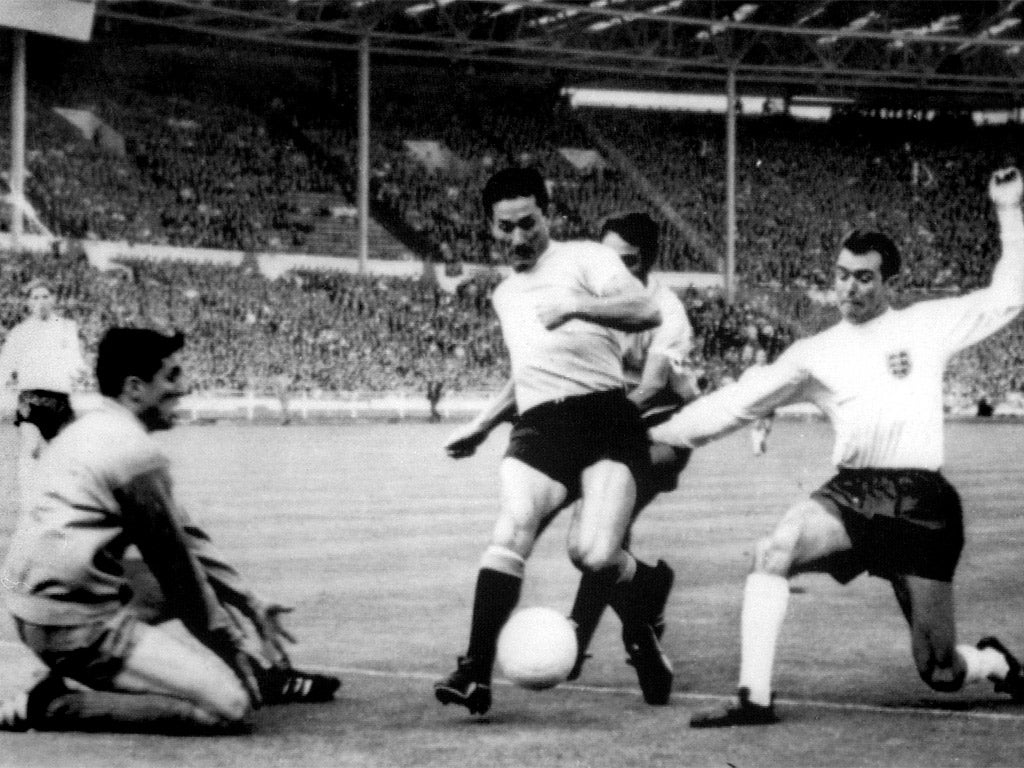Ladislao Mazurkiewicz: Goalkeeper who thwarted England in 1966

Your support helps us to tell the story
This election is still a dead heat, according to most polls. In a fight with such wafer-thin margins, we need reporters on the ground talking to the people Trump and Harris are courting. Your support allows us to keep sending journalists to the story.
The Independent is trusted by 27 million Americans from across the entire political spectrum every month. Unlike many other quality news outlets, we choose not to lock you out of our reporting and analysis with paywalls. But quality journalism must still be paid for.
Help us keep bring these critical stories to light. Your support makes all the difference.
Ladislao Mazurkiewicz, star of three consecutive World Cups for Uruguay, was considered by many of his peers, including the Soviet Union's Lev Yashin and England's Gordon Banks, as one of the finest goalkeepers of his era.
With Banks at the other end in the opening match of the 1966 World Cup at Wembley, Mazurkiewicz kept England, including the strike force of Jimmy Greaves and Roger Hunt, at bay for a goalless draw. It was the only match the host nation failed to win on their way to the trophy and it helped Uruguay get through to the quarter-finals.
Mazurka, as his compatriots found it simpler to call him, was only 21 when he was introduced to the Queen that day as she walked down a red carpet laid out on the Wembley turf. But he became a legend in Uruguay when he kissed the monarch's white-gloved hand, and it later emerged that he had said in Spanish something along the lines of: "You're like something out of a painting, ma'am. But we are going to win today!" His team-mates said his remarks sent them into stitches, eased their nerves and helped them contain the hosts for the 90 minutes.
Mazurkiewicz – his father was a Polish immigrant, his mother of Spanish origin – was probably best known for helping his nation to the semi-finals of the next World Cup, in Mexico in 1970. Even if you don't remember his name – and even the great BBC commentator Kenneth Wolstenholme had trouble pronouncing it – you will probably have seen footage of the moment he was fooled by Pele's outrageous dummy in the 1970 semi-final in Guadalajara. From a glorious through-pass from Tostao, with Mazurkiewicz racing to the edge of his area to intercept, Pele feinted to the left, dummied and ran round the Uruguayan 'keeper for what looked like an easy tap-in.
Amazingly, instead of scoring the goal of the tournament, the great Brazilian No 10 dragged it wide of the far post. An embarrassed Mazurkiewicz later claimed, with a wink, that he had "done enough to put Pele off." But although Uruguay had taken the lead, he could not stop Brazil from winning 3-1 that day and going on to beat Italy in the final. The world sports media voted the Uruguayan the best goalkeeper of the tournament and, despite their nations' traditional football rivalry, Pele and Mazurkiewicz became great friends. England's 1966 captain Bobby Moore also considered the South American with the hard-to-pronounce name one of the greatest 'keepers he had played against.
Standing just over 5ft 10in, Mazurkiewicz was nicknamed "el Chiquito" [the Little One] by players and fans of the national team known as La Celeste (the Sky Blue) from their strip. In contrast to the giant goalkeepers of today, he had to spring to tip the ball over the bar. Like the great Russian Yashin, "the Black Spider," and the 1950s Hungarian keeper Gyula Grosics – "the Black Panther" – Mazurkiewicz usually wore all-black, or occasionally all-grey. He reckoned the black outfit made him "more invisible" to opposing forwards.
Ladislao Mazurkiewicz Iglesias was born in the small Uruguayan coastal resort town of Piriapolis. His grandmother had fled with her children, including his father, as Hitler threatened Poland in 1939. He was 16 when he signed for Racing Club Montevideo in the capital as an outfield player but ended up between the sticks at the age of 18 when the regular goalkeeper had to be rushed to the dentist.
Most of his career, however, was spent across the city with FC Peñarol in the district of that name. With them he won three first division titles, the South American Copa Libertadores in 1966 and, later that year, the Intercontinental Cup, beating Real Madrid 2-0 at home and by the same score in Madrid's famous Bernabeu stadium.
He also won the Brazilian league title in 1971 with Atlético Mineiro, had spells with América Cali in Colombia and Granada in Spain and went on to manage Peñarol in the late 1980s. He died in hospital after kidney and breathing problems.
Phil Davison
Ladislao Mazurkiewicz Iglesias, footballer: born Piriapolis, Uruguay 14 February 1945; died Montevideo 2 January 2013.
Subscribe to Independent Premium to bookmark this article
Want to bookmark your favourite articles and stories to read or reference later? Start your Independent Premium subscription today.
Join our commenting forum
Join thought-provoking conversations, follow other Independent readers and see their replies
Comments